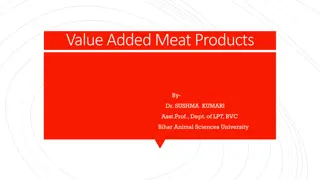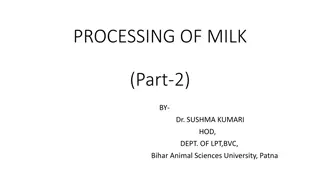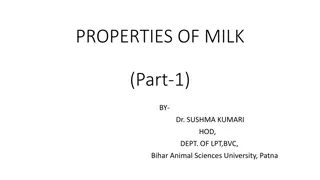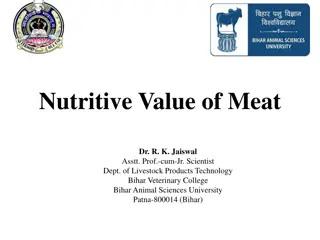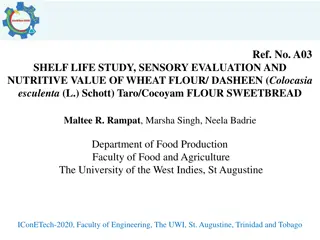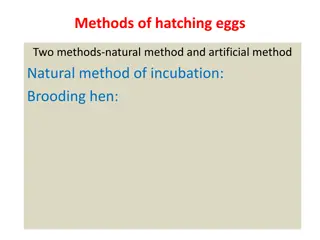Nutritive Value and Composition of Eggs by Dr. Sushma Kumari
The composition and nutritive value of eggs, as presented by Dr. Sushma Kumari from Bihar Animal Sciences University, cover various aspects including the physical composition of eggs, the composition of an eggshell, and the chemical composition of eggs. The presentation delves into details such as the protein content of different egg components, highlighting proteins like ovalbumin and conalbumin. Additionally, it discusses compounds like lysozyme and avidin found in eggs. The comprehensive exploration provides valuable insights into the nutrient profile and structure of eggs.
Download Presentation

Please find below an Image/Link to download the presentation.
The content on the website is provided AS IS for your information and personal use only. It may not be sold, licensed, or shared on other websites without obtaining consent from the author. Download presentation by click this link. If you encounter any issues during the download, it is possible that the publisher has removed the file from their server.
E N D
Presentation Transcript
COMPOSITION AND NUTRITIVE VALUE OF EGG BY- DR. SUSHMA KUMARI DR. SUSHMA KUMARI ASST.PROF., DEPT. OF LPT,BVC ASST.PROF., DEPT. OF LPT,BVC BIHAR ANIMAL SCIENCES UNIVERSITY BIHAR ANIMAL SCIENCES UNIVERSITY
PHYSICAL COMPOSITION OF EGG Egg Shell-11% Albumen- 58% Yolk- 31%
COMPOSITION OF AN EGGSHELL : Calcium carbonate 94.0% Magnesium carbonate 1.0%. Calcium phosphate 1.0%. Organic matter 4.0%
EGG PROTEIN Different types of proteins are present in egg white. Ovalbumin This constitutes 55% of the proteins of egg white. This is a phospho glycoprotein and is composed of three components A1, A2, and A3, which differ only in phosphorus content. Conalbumin This constitutes 13% protein of the egg albumin. It consists of two forms neither of which contains phosphorus nor sulphur. Nutrients Egg White Egg yolk Water 88.0 48.0 Protein 11.0 17.5 Fat 0.2 32.5 Minerals 0.8 2.0 Ovamucoid It is a glycoprotein. This constitutes about 10% of the egg white proteins. Ovomucin This protein is responsible for the jelly like character of egg white and the thickness of the thick albumen. It contains 2% of the egg white. Its content in the thick layers of albumin is about 4 times more than in thin layers. It is insoluble in water but soluble in dilute salt solution. .
Lysozyme Lysozyme content of egg is 3.5%. This is an enzyme capable of lysing or dissolving the cell wall of bacteria. It is composed of 3 components A, B and C. It binds biotin and makes the vitamin unavailable. Avidin -Avidin is 0.05% of the egg white protein. It is denatured by heat and cooked eggs and do not affect the availability of biotin. Ovoglobulin- It is a protein consisting of two components G1 and G2 and both are excellent foaming agents. Ovoinhibitor- % of egg protein is made up of ovoinhibitor. It is another protein capable of inhibiting trypsin and chymotrypsin
NUTRITIVE VALUE OF EGG WHITE AND EGG YOLK The nutritional value of an egg is divided between the egg white and the egg yolk. The white or egg albumen contains more than half the egg's total protein, niacin, riboflavin, chlorine, magnesium, potassium, sodium, and sulfur and all the egg's zinc. The yolk contains all of the fat in the egg and a little less than half of the protein. It also contains the fat-soluble vitamins A, D, and E. Egg yolks are one of the few foods naturally containing vitamin D. The yolk also provides vitamin B 12 and folic acid, and the minerals iron, calcium, copper and phosphorus. . Eggs have biological value of 93.79 %




